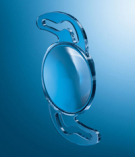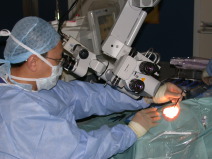
Cataract surgery
Cataract surgery is an operation to remove the cloudy lens inside the eye and replacing it with an artificial lens implant.
Over the last 2 decades, the technology of phacoemulsification machine and the technique for cataract surgery have improved dramatically. Cataract surgery now is a very safe procedure and it is commonly performed under local anaesthetic as a day case. Patients can expect 99% success rate with very low risk of complication under the hands of experienced eye surgeons.
What causes cataracts?
Cataract is commonly formed as part of an ageing process. The crystalline lens inside the eye is normally clear, over the years, the protein inside the lens undergoes an ageing process that causes gradual cloudiness and impairs vision. it is estimated 1/3 of patients age 65 or above have cataracts in one or both eyes in the UK.
Some people can develop cataract earlier due to other systemic or eye conditions, e.g. diabetes, use of systemic or topical steroid medicines, chronic eye inflammation (uveitis), ocular trauma, previous eye surgery, etc.
Children or newborn babies can also develop cataracts as an isolated or part of a systemic genetic condition, however, this is very rare.
Who are the symptoms of cataracts?
Patients commonly complain of blurry vision for distance or near vision like looking through frosted glasses. This is more obvious when cataracts develop at a different speed between the two eyes.
Patients can also complain of glare under bright sunlight or when driving at night that the headlights from the opposite side causing extreme glaring making driving dangerous.
Cataracts can affect people differently depends on job and hobbies. People require to perform minuscule tasks, e.g. watchmaker may complain of visual difficulties early than other people.
Therefore, the need for a cataract operation very much depends on the day-to-day demands of vision for that person.
Who needs cataract surgery?
When cataracts have caused significant visual difficulties for patients, then a cataract operation is warranted.
Patients with angle-closure glaucoma, the crystalline lens is too large in relation to the overall size of the eyes. This can cause gradual narrowing of the anterior chamber drainage angle as the lens grows bigger with age. This can cause acute raised eye pressure and hence acute angle-closure glaucoma attack. An early cataract operation would be necessary if the angle is still narrow after laser iridotomy treatment. Sometimes, a cataract operation is necessary even when there is no significant cataract formation in patients with very narrow anterior chamber angle and at high risk of angle-closure attack.
How to prepare for cataract operation?
Patients will require a Biometry test before cataract surgery. Biometry is a test to measure the dimension including the curvature of the cornea and the length of the eyeball in order to determine the lens implant power.
Patients need to make sure that there is no active infection (e.g. leg ulcers) in the body before undergoing cataract operation. Patients with blepharitis (chronic infection of the eyelids) should perform vigorous lid hygiene before the cataract surgery in order to reduce the local bacteria load hence reducing the risk of postoperative infection. In severe blepharitis, a course of oral antibiotics may be necessary before the operation.
Patients do not need to stop aspirin or warfarin before surgery. However, for patients on warfarin, the allowable INR level before cataract surgery depends on surgeons, so this must be discussed with your eye specialists. In general, the INR must not be higher than 4 before surgery to reduce the risk of serious bleeding at the time of surgery.
Patients with high blood pressure should make sure that their blood pressure is under good control. Excessively high blood pressure can increase the risk of complications during surgery
What to expect on the day of the operation?
Most cataract operations are performed under local anaesthetics and as day cases. You can still eat and drink normally but it is advisable not to eat excessively as this may cause indigestion when you have to lie down for a period of time during the operation. You should also take your regular medications as normal unless you have been advised differently by your GP or eye specialists. This is particularly important for medications for blood pressure and diabetes.
On admission, the nurses will instil multiple eye drops in your eyes to dilate your pupil in preparation for your surgery. You will be taken to the theatre and more eye drops will be put into your eyes to numb your eyes before surgery. Most eye surgeons will give you a small local anaesthetic injection before the operation. Your eye surgeon will use an antiseptic solution to clean the eyelids and the surrounding area of your eye and use a piece of paper sheet to cover your face so only the eye undergoing operation is exposed. A small speculum made of metal wire will be used to keep your eye open. The surgeon will carry out the operation and you can see a bright light and many patients describe that as multicoloured pattern moving around in front of their eye. You will also hear noises from the machine and even water dripping down the side of your face.
The operation usually takes 10-20 minutes. At the end of the operation, the surgeons will pull the paper sheet away from your face and place an eye pad and a plastic shield on your eye. You will be taken back to the ward or day case unit, the nurses will give you the eye drops to use after the operation and you should be able to leave the clinic/hospital and go home. You should not disturb the eye pad and shield after the operation until the next day.






